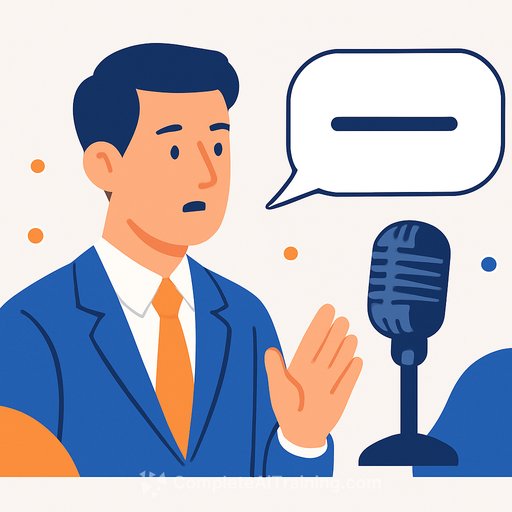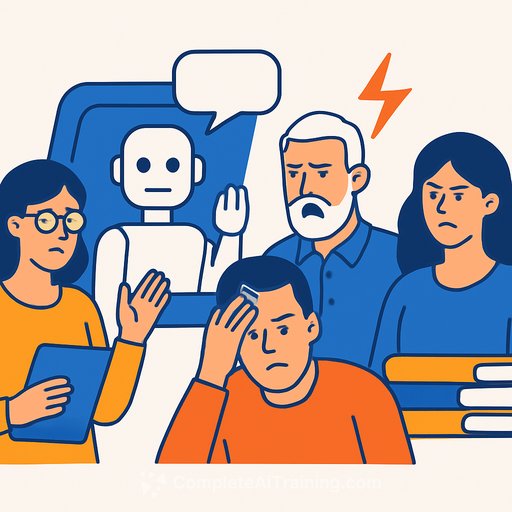Writers vs. Synthetic Fluency: Keep the Soul, Use the Tools
Last week I read an op-ed that felt familiar, not for its ideas, but for its sentence rhythm. I'd seen the same cadence in a LinkedIn post, a student essay, and an AI-generated bedtime story. That wasn't coincidence. A 2024 survey says 43% of college students have used ChatGPT for schoolwork-more than half for essays.
We aren't at war with AI. We're in a joint venture: our fatigue meets its mimicry. The robots aren't stealing our best work; they're upgrading our bare minimum. And we seem fine with that-as long as one more paragraph can be outsourced to the algorithmic abyss.
The Smoothness Problem
Professors are getting papers that "flow well" and say nothing. That's synthetic fluency-polished, tidy, and strangely empty. It reads like LinkedIn talking to itself after three coffees. No wrong notes, no real notes.
We used to recognize mediocrity. The clunky metaphors gave away a rushed mind that still cared. Today's mediocrity glides. It feels frictionless because it has no skin in the game.
"Ghiblification" Isn't Homage
Last month's wave of Studio Ghibli-style images turned feeds into pastel mood boards. It was cute, fast, and forgettable. Hayao Miyazaki has called AI animation "an insult to life itself," recoiling at demos that, in his words, "have no idea what pain is."
If you borrow the vibe but skip the years, you're not honoring the craft; you're simulating it. The audience scrolls. The creator economy shrinks into a template. For reference on Miyazaki's stance, see this coverage from The Guardian: "AI is an insult to life itself".
What This Means for Working Writers
The threat isn't that AI will out-write you. It's that it will normalize "good enough" to the point your voice starts imitating a machine's idea of you. Your edge is what a model can't see: choices shaped by time, pain, taste, and receipts.
Use AI Without Losing Your Voice
- Outsource grunt work, not judgment. Let tools summarize, cluster notes, or extract quotes. You decide the angle, the stakes, and the line that matters.
- Write an ugly first draft fast. 20-30 minutes, no editing. Only then ask AI to highlight gaps or reorder sections. Draft first, prompt second.
- Force specificity. Add proper nouns, dates, prices, places, and names. Models generalize; you get paid to be specific.
- Track lived experience. Keep a daily note of observations, phrases, overheard lines, and micro-stories. Feed these into your work; models can't fake them well.
- Make a claim, then test it. Ask: who disagrees, what data cuts against me, and what would change my mind? Add the counterpoint in-line.
The Anti-Mediocrity Checklist (Ship With This)
- One fresh frame: Did I state the core idea in a way I haven't seen 1,000 times?
- Two "proofs of life": Sensory detail, scene, or anecdote only I could provide.
- Three specifics: Names, numbers, or sources that anchor the claim.
- One hard edit: Cut every sentence that survives on vibe alone.
- Voice pass: Read it out loud. If it sounds like corporate small talk, rewrite.
Prompts That Keep Your Work Human
- For structure: "Here's my rough draft. Propose 3 outlines that raise stakes, add conflict, and maintain my tone. Do not add generic advice."
- For friction: "List the strongest counterarguments to my thesis, with sources. Flag any claims that need data."
- For distinct voice: "Identify clichés and vague phrases. Suggest 3 concrete rewrites for each, preserving my style."
Line-Level Upgrades That Beat Synthetic Fluency
- Ban these fillers: "in today's world," "ever-evolving," "game changing," "at the end of the day." Replace with a fact, a scene, or nothing.
- Prefer verbs over abstractions: "Readers quit at paragraph three" beats "engagement decreases across content."
- Use contrast: Set up an expectation, then break it. Tension makes ideas sticky.
- End with a turn: Last sentence should change how the reader sees the idea, not just restate it.
Ethics and Credit
- Don't fake lived experience. If AI helped draft, say so when it matters (client deliverables, academic contexts).
- Cite sources. Link where you can, and verify anything that looks too clean. The model's confidence is not evidence.
A Weekly Practice That Compounds
- Monday: Collect five observations from life or work. One paragraph each, no polishing.
- Wednesday: Draft an article using two of those observations. 45 minutes timer, no backspace.
- Friday: Edit with the checklist above. Use AI only for restructuring and counterarguments.
- Monthly: Publish a "failed ideas" post. Show your cuts. Readers trust edges, not polish.
The Point
AI won't kill your craft. Convenience will. If you protect your taste, your sources, and your scars, you'll write work no model can mimic.
The robots are not here to take away our greatness. They're here to improve our mediocrity-if we let them. Your job is to make that impossible.
Further Resources
Your membership also unlocks:






